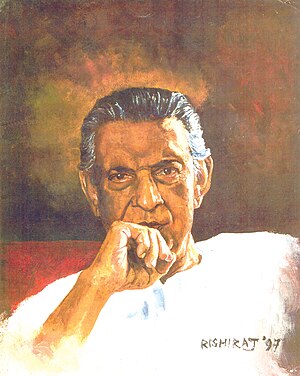 A portrait of Satyajit Ray | ||||||||||||||||||||||||||||||||||||||||||||||||||||||||||||||||||||||||||||||||||||||||||||||||||||||||||||||||||||||||||||||||||||||||||||||||||||||||
| ||||||||||||||||||||||||||||||||||||||||||||||||||||||||||||||||||||||||||||||||||||||||||||||||||||||||||||||||||||||||||||||||||||||||||||||||||||||||
Satyajit Ray (; 2 May 1921 – 23 April 1992) was an Indian filmmaker who worked prominently in Bengali cinema. Ray received numerous awards and honours, including India's highest award in cinema, the Dadasaheb Phalke Award (1984) and India's highest civilian award, the Bharat Ratna (1992). He was also awarded the Commander of the National Order of the Legion of Honour, the highest decoration in France (1987) and an Honorary Award at the 64th Academy Awards (1991).[1]
Often regarded as one of the greatest filmmakers of world cinema,[2] Ray made his directorial debut in 1955 with Pather Panchali.[3][4] The film earned critical acclaim and was awarded under the Best Film category at various award ceremonies and film festivals, including the 3rd National Film Awards (1955), 7th Berlin International Film Festival (1957), and 1st San Francisco International Film Festival (1957). Pather Panchali was also awarded the "Prix du document humain" prize at the 9th Cannes Film Festival (1956). Ray won thirty-five National Film Awards during his four-decade career. Six of his films—Pather Panchali, Apur Sansar (1959), Charulata (1964), Goopy Gyne Bagha Byne (1968), Seemabaddha (1971), and Agantuk (1991)—won the Best Feature Film. Three films—Jalsaghar (1958), Abhijan (1962), and Pratidwandi (1970)—were awarded with Second Best Feature Film and Mahanagar (1963) was adjudged the Third Best Feature Film. Ray's 1961 documentary on Nobel laureate Rabindranath Tagore received awards at the Locarno and Montevideo film festivals as well as the National Film Award for Best Non-Feature Film. His Hindi film Shatranj Ke Khilari (1977) won the National Film Award for Best Feature Film in Hindi, and the Filmfare Award for Best Director. Ray's Apu Trilogy (1955–59), comprising Pather Panchali, Aparajito (1956) and Apur Sansar (1959), appeared in Time's All-Time 100 Movies in 2005.[5]
Ray won 21 awards for his direction, including seven Bengal Film Journalists' Association Awards, six Indian National Film Awards, two Silver Bear awards at the Berlin International Film Festival, and two Golden Gate Awards at the San Francisco International Film Festival. In addition to directing, Ray was a music composer and also wrote the screenplay, lyrics, and dialogues for several films.[3] He won twelve awards for his screenplay writing, including one posthumous award in 1994, one award for his original story idea, seven awards for his dialogues, five awards for his music compositions, and two awards for lyric-writing.
Ray also received various awards and honours at international film festivals and universities. These include awards at the 9th Chicago International Film Festival (1973), 28th Berlin International Film Festival (1978), 11th Moscow International Film Festival (1979), 35th Cannes Film Festival (1982), 39th Venice International Film Festival (1982), 4th Tokyo International Film Festival (1991), and 35th San Francisco International Film Festival (1992). He was also awarded an honorary doctorate from the Royal College of Art (1974), a Doctor of Letters from the University of Oxford (1978), the British Film Institute Fellowship (1983), and two Sangeet Natak Akademi awards (1959, 1986).
Cite error: There are <ref group=lower-alpha> tags or {{efn}} templates on this page, but the references will not show without a {{reflist|group=lower-alpha}} template or {{notelist}} template (see the help page).
- ^ "Fondements et histoire" (in French). legiondhonneur.fr. Archived from the original on 15 October 2014. Retrieved 26 June 2015.
- ^ "Sight and Sound Poll 1992: Critics". California Institute of Technology. Archived from the original on 18 June 2015. Retrieved 3 February 2013.
- Kevin Lee (5 September 2002). "A Slanted Canon". Asian American Film Commentary. Archived from the original on 31 May 2012. Retrieved 3 February 2013.
- "Greatest Film Directors and Their Best Films". Filmsite.org. Archived from the original on 19 April 2015. Retrieved 3 February 2013.
- "The Greatest Directors Ever by Total Film Magazine". Filmsite.org. Archived from the original on 26 April 2014. Retrieved 3 February 2013.
- ^ a b Robinson 1989, pp. 352–364.
- ^ Ray 2013, pp. 138–161.
- ^ Schickel, Richard (12 February 2005). "Time 100: The Apu Trilogy". Time. Retrieved 3 February 2013.